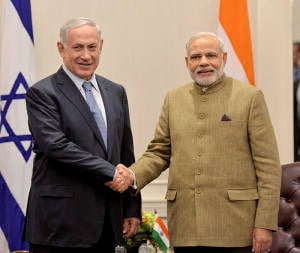The prime ministers of Israel and India met in New York to bolster ties and discuss future developments, and the prospects seem promising.

Prime Ministers Benjamin Netanyahu (L) and Narendra Modi. (Photo: Avi Ohayon/GPO)
For the first time in over a decade, the leaders of Israel and India met on Sunday to discuss current issues and develop bilateral ties between the two nations. Prime Minister Benjamin Netanyahu met with Indian Prime Minister Narendra Modi in New York on the sidelines of the United Nations General Assembly.
Iranian Nuclear Threat
Netanyahu raised the issue of the danger of a nuclear-armed Iran as well as the global threat posed by Islamic terrorism.
Iranian President Hassan Rouhani had stated during his address at the UN last Tuesday that “nuclear weapons and other weapons of mass destruction have no place in Iran’s security and defense doctrine and contradict our fundamental religious and ethical convictions. Our national interests make it imperative that we remove any and all reasonable concerns about Iran’s peaceful nuclear program.”
Israel remains unconvinced by these remarks and still fears Iran intends to build a nuclear bomb that will threaten its existence.
Cultivating Bilateral Cooperation
Israel and India enjoy the sharing of technological development, and India is one of Israel’s biggest clients in the defense technologies market. Netanyahu proposed during the meeting that Israel and India advance this cooperation, especially in the fields of agriculture and water technology. He updated his Indian counterpart on his decision to establish a national cyber defense authority and proposed bilateral contacts on the issue; Netanyahu stressed that cyber technology is certain to become a significant economic sector.
“This is an opportunity for Israel and India to expand further our relationship,” the Israeli prime minister stated. “We are two old peoples, some of the oldest in the nations on earth, but we are also two democracies. We’re proud of our rich traditions, but we’re also eager to seize the future.” He further stated his belief that collaboration between Jerusalem and New Delhi would benefit both sides.
Netanyahu invited Modi to visit Israel, saying: “I know you’ve been there before. It will be a pleasure to welcome you again. We’re very excited by the prospects of greater and greater ties with India; we think the sky is the limit.”
Historical Relations
Referring to the historic relationship between Israel and India, Modi replied:
“I met this morning with the people from the Jewish community, American Jewish Committee, and they all appreciated that there is a deep recognition in Israel that India is the only country where anti-Semitism has never been allowed to come up, where Jews have never suffered and have lived as an integral part of our society. There was a time in the city of Mumbai that Hebrew was officially taught in the university and even one of the mayors of Mumbai city was from a Jewish family.”
India established full official diplomatic ties with Israel only in 1992, but Israel had a consulate in Mumbai operating since 1953. The ties strengthened quickly, and in 2003 Prime Minister Ariel Sharon was the first Israeli leader to visit New Delhi. Israel was one of the few countries visited by Modi before his election as prime minister.
The two governments regularly arrange work visits that include meetings with industrialists and businessmen, exchanges of academic and political delegations, artists, scholars and more. Bilateral consultations between the Indian Ministry of External Affairs and Israel’s Ministry of Foreign Affairs are held annually, alternately in Jerusalem and New Delhi, since 1999. The latest bilateral treaty between the two countries, a three-year work plan for cooperation in the field of agriculture, was signed in 2006.
Author: Aryeh Savir
Staff Writer, United with Israel
(With files from the Government Press Office)
